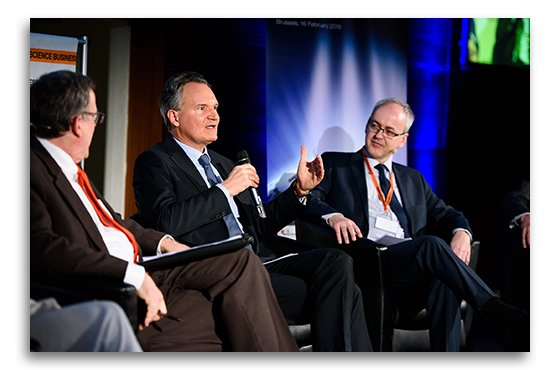3d Impact supported over 400 Research and Innovation Projects

Roy Pennings participating in a panel discussion with the then-EC Director-General for Research Robert-Jan Smits during the February 2016 ScienceBusiness conference on the mid-term evaluation of H2020.
3d Impact has over 23 years of experience in grant project development. Over 400 EU research & innovation projects were supported through brainstorming sessions, concept-development, consortium-creation, proposal writing, proposal reviews and project implementation support.
Over the past years, a large number of academic and industrial organisations (corporates as well as SMEs) have used this expertise to make decisions on growth strategies in the context of European innovation policy and funding support. Please click on the LinkedIn Logo below to see a selection of the EU research and innovation projects that we were actively involved in during their development, writing and/or management phases.
The projects - funded through different EU programmes - range from fundamental science in physics, chemistry, earth sciences, medicine and linguistics to innovations in sustainable energy (wind, solar, thermal), transportation and EU cultural identity. EU funding programmes in which proposal writing or project management support was provided to support clients include: Horizon Europe, H2020, FP7, FP6, COST, LIFE/LIFE+, EEPR and NER300 (11 supported proposals; 6 funded projects covering total investment of €1,1 Billion), TEN-e/CEF (energy projects), ECSEL Joint Undertaking (now: KDT JU), TEN-t (Transport/Mobility projects), Interreg, ESF, LifeLong Learning Programme (Leonardo), CIP, EIB Project Loans, HEALTH, MEDIA, TWINNING, EIT-KIC, EUROSTARS.
3d Impact is currently engaged in several Horizon Europe grant projects.
Following the overall project coordinatorship of the H2020 European Spallation Source "BrightnESS" project (supporting the first ever 'in-kind contribution process' from a multitude of national research organisations to the ESS ERIC), Roy managed the H2020-ECSEL "SECREDAS" project on critical security, safety and privacy issues related to autonomous vehicles and road infrastructure. This project involved 73 project partners from across Europe. An integrated video presentation of the on-road demos and underlying technologies can be found on the SECREDAS website. The SECREDAS project ended in October 2021 with a successful project review by the European Commission and 4 external reviewers. In their words: “We have a positive impression of the project. We see a good evolution and technical advancement for the community. The project has achieved good individual results and showed them in a multitude of demonstrators. The standardisation work and the dissemination efforts to the public are much appreciated”.
Roy went on to write and subsequently manage the Horizon Europe-KDT funded "TRISTAN" project, which comprises 46 leading European partner organisations in microchip development. The project focuses on the development of a European competitive RISC-V microprocessor ecosystem. It includes the expansion and support of the HW/SW architecture. electronic design automation tools, drivers and peripherals. The European Commission considers Tristan a critically important project in its drive to become more independent and self-sustaining in the field of micro-processing. The project will continue until 2025.
Roy handed over the TRISTAN project in 2023 to take over the development and running of CERN's Green Village initiative. This initiative opens up the CERN campus to act as demonstration site for European research projects related to environmental sustainability (built-environment, flora/fauna, waste, energy) and mobility. For reference: the campus has over 660 buildings, 54km of roads, 64km of tunnels and over 500ha of green spaces and open fields/forests. Direct collaboration on novel sustainability technologies with individual companies or start-ups is also possible. In return, partners not only gain access to CERN's elaborate infrastructure, but also to top-level expert personnel and the CERN international network. As an international organization, CERN maintains its own rules and regulations on everything related to its territory, which allows it to take fast decisions and avoid lengthy permitting procedures. It makes the CERN Green Village a neutral and ideal location for running single or multi-partner pilots and demonstrations.




